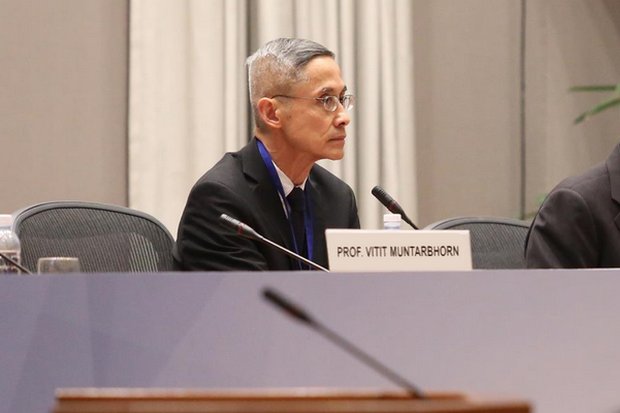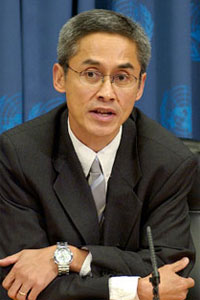
The issue of accountability for international crimes has come to the fore poignantly with the report of the UN's Independent International Fact-finding Commission on Myanmar. The Commission finds that there are reasonable grounds to believe that genocide, crimes against humanity and war crimes have been committed in the country, particularly impacting on the Rohingya community in Rakhine state. Significantly, it calls upon Asean to "develop strategies to ensure accountability for perpetrators of crimes under international law, including through sustained engagement with Myanmar and support for an international justice mechanism".
Can Asean really develop a strategy or strategies on accountability in relation to such crimes? The obvious impediments include the "Asean's non-interference in internal affairs" argument and consensus-based decision-making which are often invoked by less liberal sectors in the region, steeped in a sense of exceptionalism. Yet, the shocking violations in Rakhine state and other regions of Myanmar are a blight on the history of Southeast Asia which demand justice and action against impunity.
In essence, accountability is about the framework of responsibility, the groundwork against impunity and the homework of remedies. It may pertain to responsibility on the part of the state, individuals and or groups. It is not only about criminal responsibility but also about civil liability. In a less legal sense, it concerns a gamut of leverages to hold those responsible for human rights violations to account, which may include political and social pressures, especially with a robust civil society and media, such as through societal exposure and recrimination. It has also a historical and psychological edge pertaining to the call for transparent documentation of historical events and the ventilation of grievances through a cathartic truth-seeking avenue.
There are various possibilities interconnecting between accountability and Asean member countries as a response to the situation at hand. Firstly, given that the various justice related mechanisms in Myanmar are unable or unwilling to act to render justice, other Asean countries might consider applying individually the concept of "universal jurisdiction" to extend their jurisdiction to cover international crimes such as genocide. This implies that a local court can exercise jurisdiction over major crimes committed outside its territory, even where its nationals are not involved. The UN Commission above hints at this possibility.
Secondly, Asean countries should not obstruct the international justice mechanisms advocated by the Commission which concern the criminal responsibility of individuals. The Commission has called for recourse to the International Criminal Tribunal (ICC) or the setting up of a special court to deal with the situation. Given that Myanmar is not a party to the Statute of the ICC, it is not possible to refer Myanmar nationals to the court through this channel. The only other route for accessing this court is to have a UN Security Council resolution referring the alleged perpetrators to the court. However, there is always the threat of a veto being cast by one of the permanent members of the Security Council (as has happened, for example, in the case of Syria).
Interestingly, there has now emerged an issue concerning whether Bangladesh, which has been affected by the influx of over 700,000 Rohinyga refugees since violence broke out in Rakhine state in August last year, might be able to ask the court to exercise its jurisdiction, given that Bangladesh is a member of the statute of the ICC. The ICC prosecutor is now looking into the matter.
Thirdly, it is not unlikely that after the various discussions in the UN Human Rights Council, the UN General Assembly and or the UN Security Council, a follow-up mechanism will be established by the UN to consolidate information and pursue other steps. The UN Commission initiated the very important work of documentation of crimes to help identity the perpetrators and this needs to be continued.
The methodology for the work has been to access primary sources to establish the facts. Thus the Commission based its initial findings on nearly 900 victims and witnesses, and their testimonies were verified and corroborated with other sources of information as part of the cross-checking. Asean countries should facilitate further fact-finding by enabling the follow-up mechanism to access their territories and related information.
Fourthly, in the more political sphere, the listing of the nationals of other countries for visa bans, assets confiscation and other coercive measures are a testament to the broader vistas of accountability. This is already being implemented by some countries beyond the Asean region and remains an option open to Asean countries. There is also room for mutual cooperation between Asean countries and other parts of the world to help trace ill-gotten proceeds and impound them.
Fifthly, the technological and business sectors in the Asean region can be of assistance. Blocking of materials inciting hatred coming through social media has already been initiated by internet platforms and should be strengthened. This would also enhance commitment to the UN's guiding principles on business and human rights which Thailand is now aspiring to lead.
Sixthly, humanitarian assistance and the establishment of a fund to help the victims of those crimes are needed, and Asean states together with civil society can help much to contribute to providing some of the remedies, at least through helping the victims. Return of refugees to their country of origin must be based upon return in safety and dignity.
Finally, there can be no substitute for humane leadership in the region. The various Asean mechanisms and processes, including the Asean Summits, meetings of foreign ministers, and the Asean Inter-governmental Commission on Human Rights, should adopt creative ways of leveraging with the country in question so as to not to condone those crimes.
This should be complemented by intra-faith and inter-faith programmes to nurture cross-cultural understanding from a young age and build inclusive space through education and capacity-development to prevent recurrence of violations.
A coherent strategy on accountability is thus pivotal as part of the universal truth that there can be no peace without justice.
